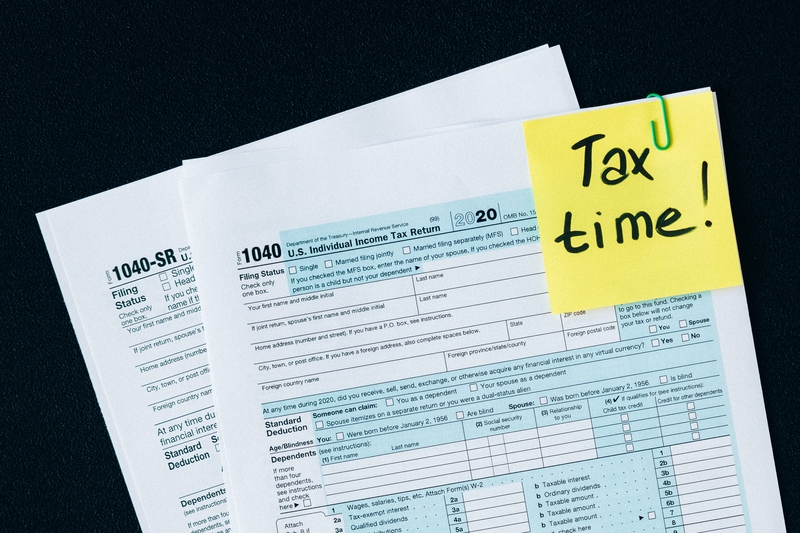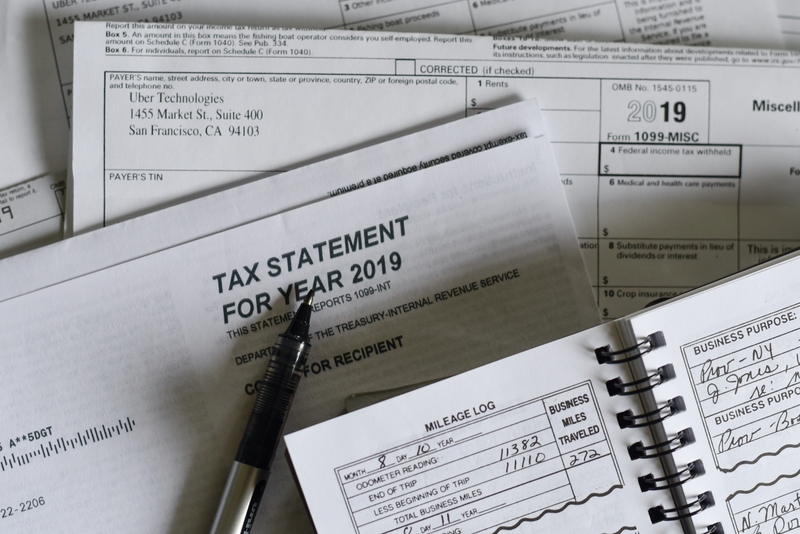Navigating Tax Season: A Comprehensive Guide to Tax Filing Assistance Programs
"The tax code is so complicated and the forms are so confusing, that we have created an entire industry of tax preparers and advisers to help people navigate the process." - Bernie Sanders
Brief Insight
Tax filing assistance programs are designed to help individuals who may not have the resources or expertise to navigate the tax system on their own. These programs provide free or low-cost tax preparation services, guidance on tax credits and deductions, and support for filing taxes accurately and on time. They are particularly important for low-income families, seniors, and individuals with disabilities who may qualify for tax benefits but may not know how to claim them.

PHOTO: https://www.pexels.com/uk-ua/@n-voitkevich/
Navigating the Complex World of Taxes
Tax Filing Assistance Programs are programs that provide free or low-cost assistance to individuals who may have difficulty navigating the complex process of filing taxes. These programs are typically operated by non-profit organizations or government agencies and are designed to help low-income families, seniors, and individuals with disabilities who may not have the resources or expertise to file their taxes on their own.
The assistance provided by tax filing assistance programs can include a range of services, such as help in preparing tax forms, guidance on tax credits and deductions, and support for filing taxes accurately and on time. Some programs also offer financial education and planning services, such as assistance with creating a household budget or opening a savings account.
One of the most important benefits of tax filing assistance programs is that they can help individuals and families access the tax benefits and refunds they are entitled to. For example, low-income families may qualify for the Earned Income Tax Credit (EITC), but may not know how to claim it. Tax filing assistance programs can help these families understand the eligibility requirements and claim the credit on their tax returns.
Tax filing assistance programs are particularly important for vulnerable populations, such as seniors and individuals with disabilities, who may face additional barriers to accessing the tax system. For example, seniors may struggle with the physical or cognitive challenges of filling out tax forms, while individuals with disabilities may have difficulty accessing tax preparation services that are not accessible.
Tax Filing Assistance Programs are an essential resource for individuals and families who need help navigating the tax system. By providing expert guidance and support, these programs can help ensure that everyone has access to the benefits and protections of the tax code, regardless of their income or background.
Last Trends
Online filing assistance: With the widespread use of technology, many filing assistance programs now offer online options to help individuals and businesses file their taxes, complete legal documents, or apply for government benefits. An online filing assistance is often faster and more convenient, and it can be accessed from anywhere with an internet connection.
From the 1960s to Today: A History of Tax Filing Assistance Programs in the US
Tax Filing Assistance Programs have a long history dating back to the 1960s when the US government started providing free tax preparation services to low-income taxpayers through the Volunteer Income Tax Assistance (VITA) program. Over the years, the VITA program has expanded to include more than 5,000 sites nationwide, staffed by trained volunteers who provide free tax preparation services to individuals and families earning less than $57,000 per year.
In addition to the VITA program, the US government also established the Tax Counseling for the Elderly (TCE) program in 1978 to provide free tax preparation services to seniors aged 60 and older. The TCE program is staffed by volunteers who are specially trained to address the unique tax issues faced by seniors, such as retirement income, pension plans, and Social Security benefits.
In recent years, the US government has also partnered with private organizations to expand access to tax filing assistance programs. For example, the Internal Revenue Service (IRS) has partnered with software companies to provide free online tax preparation services to individuals and families earning less than $72,000 per year through the Free File program. The program offers a range of tax preparation software options, including both free and paid options, to help taxpayers choose the best option for their needs.
The COVID-19 pandemic has also highlighted the importance of tax filing assistance programs, as many individuals and families faced new challenges and financial difficulties. In response, the US government expanded the VITA program and created new programs, such as the Economic Impact Payment (EIP) Information Center, to provide guidance and support for taxpayers navigating the tax system during the pandemic.

PHOTO: https://www.pexels.com/uk-ua/@n-voitkevich/
Funding Tax Filing Assistance Programs: A Look at the Sources of Support
Tax Filing Assistance Programs are funded by a variety of sources, including the federal government, state governments, private foundations, and individual donors. The specific funding sources for each program can vary depending on the organization that operates it and the population it serves.
The largest source of funding for Tax Filing Assistance Programs is the federal government, which provides support through a range of programs, including the Volunteer Income Tax Assistance (VITA) and Tax Counseling for the Elderly (TCE) programs. The VITA program, for example, receives funding from the Internal Revenue Service (IRS), which provides grants to local organizations to operate VITA sites and train volunteers. The TCE program, on the other hand, is funded through a grant from the Administration for Community Living, which supports organizations that provide services to seniors.
In addition to federal funding, Tax Filing Assistance Programs may also receive support from state and local governments. For example, some states have established their own tax preparation programs to provide free or low-cost assistance to residents. Private foundations, such as the Ford Foundation and the Rockefeller Foundation, may also provide funding to support Tax Filing Assistance Programs, particularly those that serve underserved or marginalized communities.
Finally, individual donations are an important source of funding for many Tax Filing Assistance Programs. Many organizations that provide tax preparation services rely on donations from individuals and businesses to support their operations and expand their reach.
Tax Filing Assistance Programs are funded through a variety of sources, including government grants, private foundations, and individual donations. By leveraging these funding sources, these programs are able to provide vital assistance to individuals and families who may not have the resources or expertise to navigate the tax system on their own.
Last Trends
Mobile filing assistance: Mobile filing assistance programs have become increasingly popular, especially among younger generations. These programs allow users to file their taxes or complete legal documents using their smartphones or tablets. This makes it easier for people who are always on the go or who don't have access to a computer.
Behind the Scenes: How Tax Filing Assistance Programs are Administered
Tax Filing Assistance Programs are administered by a range of organizations, including government agencies, non-profit organizations, and private companies. The specific administration of each program can vary depending on the organization that operates it and the population it serves.
The Volunteer Income Tax Assistance (VITA) program, for example, is administered by the Internal Revenue Service (IRS), which provides grants to local organizations to operate VITA sites and train volunteers. These local organizations are responsible for recruiting and training volunteers, setting up tax preparation sites, and ensuring that taxpayers receive accurate and timely assistance.
The Tax Counseling for the Elderly (TCE) program, on the other hand, is administered by the Administration for Community Living, which provides grants to organizations that serve seniors. These organizations are responsible for recruiting and training volunteers who are specifically trained to address the unique tax issues faced by seniors, such as retirement income, pension plans, and Social Security benefits.
In addition to government-administered programs, there are also private companies that offer tax filing assistance services. These companies, such as H&R Block and TurboTax, operate for-profit businesses that provide tax preparation services to individuals and families. While these companies are not funded by the government, they may participate in government-sponsored programs, such as the Free File program, to provide free tax preparation services to eligible taxpayers.
Overall, Tax Filing Assistance Programs are administered by a range of organizations, each with its own unique approach and focus. By leveraging the expertise of government agencies, non-profit organizations, and private companies, these programs are able to provide vital assistance to individuals and families who may not have the resources or expertise to navigate the tax system on their own.

PHOTO: https://unsplash.com/@towfiqu999999
Who Qualifies for Tax Filing Assistance Programs?
Tax Filing Assistance Programs are designed to help individuals and families who may need assistance in navigating the complex process of filing their taxes. Eligibility for these programs can vary depending on the specific program and the organization that operates it.
In general, eligibility for Tax Filing Assistance Programs may be based on factors such as income, age, disability status, or other criteria. For example, the Volunteer Income Tax Assistance (VITA) program is available to individuals and families with an annual income of $57,000 or less, while the Tax Counseling for the Elderly (TCE) program is specifically designed to help seniors aged 60 and older.
Other Tax Filing Assistance Programs may be available to specific populations, such as individuals with disabilities, non-English speakers, or those living in rural areas. For example, the IRS offers a program called the Disability Navigator Program, which provides free tax preparation services to individuals with disabilities and their families.
In addition to government-sponsored programs, there are also private companies that offer tax filing assistance services. These companies may offer free or low-cost tax preparation services to eligible taxpayers, such as those with low incomes or military personnel.
Overall, eligibility for Tax Filing Assistance Programs can vary depending on the specific program and the organization that operates it. However, these programs are generally designed to help individuals and families who may face challenges in navigating the complex process of filing their taxes, such as those with low incomes, seniors, individuals with disabilities, and non-English speakers.

PHOTO: https://unsplash.com/@walkingondream
The Advantages of Tax Filing Assistance Programs
Tax Filing Assistance Programs offer a range of benefits and advantages to individuals and families who may need help navigating the complex process of filing their taxes. These programs are designed to ensure that everyone has access to the resources they need to comply with their tax obligations and maximize their financial well-being.
Here are some of the key advantages and benefits of Tax Filing Assistance Programs:
- Free or low-cost tax preparation services: Many Tax Filing Assistance Programs provide free or low-cost tax preparation services to eligible individuals and families. This can help ensure that everyone has access to professional tax preparation assistance, regardless of their income level.
- Education and outreach: Tax Filing Assistance Programs also provide education and outreach services to help individuals and families understand their tax obligations and rights. This can include workshops, seminars, and other events designed to help people learn more about the tax system and how to file their taxes.
- Assistance with tax credits and deductions: Tax Filing Assistance Programs can help individuals and families take advantage of tax credits and deductions that they may be eligible for. For example, programs may help taxpayers claim the Earned Income Tax Credit (EITC) or the Child Tax Credit, which can provide significant financial benefits.
- Reduced risk of errors and penalties: By providing professional tax preparation assistance, Tax Filing Assistance Programs can help reduce the risk of errors and penalties that can result from mistakes made when filing taxes.
- Assistance with tax-related problems: Tax Filing Assistance Programs can also provide assistance to individuals and families who are facing tax-related problems, such as unpaid taxes, audits, or other issues. These programs can help taxpayers understand their rights and options, and may provide advocacy or legal assistance as needed.
Overall, Tax Filing Assistance Programs provide a range of benefits and advantages to individuals and families who may need help navigating the often-confusing process of filing their taxes. By providing free or low-cost tax preparation services, education and outreach, assistance with tax credits and deductions, and help with tax-related problems, these programs can help ensure that everyone has access to the resources they need to comply with their tax obligations and maximize their financial well-being.
Last Trends
Virtual assistance: With the COVID-19 pandemic, many filing assistance programs have shifted to virtual assistance to ensure the safety of their staff and clients. Virtual assistance allows users to connect with filing assistance experts via video conferencing, phone, or email. This has proven to be a convenient and effective way to get assistance while maintaining social distancing protocols.
The Pros and Cons of Tax Filing Assistance Programs: Understanding Limitations and Drawbacks
While Tax Filing Assistance Programs offer a range of benefits and advantages to individuals and families who need help filing their taxes, there are also some limitations and disadvantages to consider. These may include:
- Limited availability: Tax Filing Assistance Programs may not be available in all areas, or may only be available during certain times of the year. This can make it difficult for some taxpayers to access the services they need.
- Eligibility requirements: Eligibility requirements for Tax Filing Assistance Programs can vary depending on the program and the organization that operates it. This can make it difficult for some individuals and families to access the services they need, particularly if they don't meet the specific criteria for a particular program.
- Long wait times: During tax season, Tax Filing Assistance Programs may experience long wait times for appointments or walk-in services. This can make it difficult for taxpayers to get the help they need in a timely manner.
- The limited scope of services: Tax Filing Assistance Programs may only offer certain types of services, such as basic tax preparation or assistance with specific tax credits or deductions. This can limit the level of assistance that some taxpayers receive.
- Errors and omissions: While Tax Filing Assistance Programs are designed to help reduce errors and omissions on tax returns, mistakes can still occur. Taxpayers who rely on these services may still be subject to penalties or other consequences if errors are made on their tax returns.
Overall, Tax Filing Assistance Programs offer a valuable service to many individuals and families who need help filing their taxes. However, there are also some limitations and disadvantages to consider. These may include limited availability, eligibility requirements, long wait times, the limited scope of services, and the risk of errors and omissions.

PHOTO: https://unsplash.com/@kellysikkema
Step-by-Step Guide to Getting Help with Your Taxes
To apply for Tax Filing Assistance Programs, individuals and families should follow these steps:
- Research available programs: Start by researching available Tax Filing Assistance Programs in your area. You can do this by searching online, contacting local nonprofits or community organizations, or visiting a local library or community center. Make a list of programs that may be a good fit for your needs.
- Check eligibility requirements: Once you have a list of potential programs, check the eligibility requirements for each one. Some programs may have income or other eligibility requirements, while others may be open to all taxpayers.
- Schedule an appointment: Contact the programs that you are interested in and schedule an appointment. Some programs may offer walk-in services, while others may require an appointment.
- Gather necessary documents: Before your appointment, gather any necessary documents, such as your W-2s, 1099s, and other tax-related documents. You should also bring any relevant receipts or documents related to deductions or credits you plan to claim.
- Attend your appointment: Attend your scheduled appointment with the Tax Filing Assistance Program. Be prepared to answer questions about your income and expenses, and provide any necessary documents. The program may prepare and file your tax return for you, or provide guidance as you prepare your own return.
- Follow up as needed: If there are any issues or questions related to your tax return, follow up with the Tax Filing Assistance Program as needed.
Last Trends
Personalized assistance: Filing assistance programs are now providing more personalized assistance to users. Instead of just offering generic advice, these programs can analyze a user's financial or legal situation and offer customized guidance on how to file their taxes or complete legal documents.
- Tax Filing Assistance Programs provide free or low-cost assistance to individuals and families who need help filing their taxes.
- These programs are typically run by non-profit organizations or community groups and may be staffed by volunteers or paid professionals.
- Tax Filing Assistance Programs can help taxpayers save money on tax preparation fees and maximize their refunds by ensuring they claim all eligible deductions and credits.
- Eligibility requirements, availability, and the scope of services offered may vary by program and organization.
- While Tax Filing Assistance Programs offer many benefits, there may be limitations and drawbacks to consider, such as long wait times or limited availability of certain services.
FAQ
Who can benefit from Tax Filing Assistance Programs?
Tax Filing Assistance Programs are available to low-income individuals and families, seniors, people with disabilities, and others who may have difficulty filing their taxes on their own.
What services do Tax Filing Assistance Programs offer?
Tax Filing Assistance Programs may offer a range of services, including tax preparation, tax counseling, and assistance with filing for tax credits and deductions.
Are Tax Filing Assistance Programs free?
Many Tax Filing Assistance Programs are free, but some may charge a small fee for certain services. It is important to check with the specific program for information about fees.
Where can I find Tax Filing Assistance Programs?
Tax Filing Assistance Programs can be found through various sources, such as online searches, local community centers, libraries, or nonprofit organizations.
What documents do I need to bring to my Tax Filing Assistance Program appointment?
The specific documents you need to bring may vary by program, but generally, you will need to bring any W-2s, 1099s, and other tax-related documents, as well as receipts or documents related to deductions or credits you plan to claim.
Can Tax Filing Assistance Programs file my taxes electronically?
Yes, many Tax Filing Assistance Programs can file taxes electronically, which can result in faster refunds.
What if I have questions or issues after my tax return has been filed?
If you have questions or issues after your tax return has been filed, you can contact the Tax Filing Assistance Program for guidance or assistance.